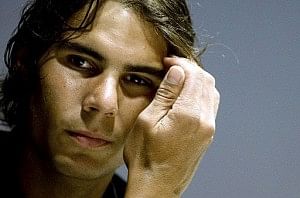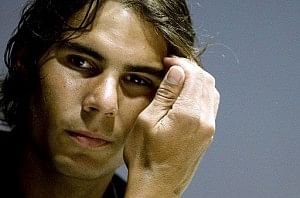
Nadal Has a New Opponent: The Cynic
I suppose you could say it’s just the way things roll, but there’s something a little disturbing about how swiftly and gleefully the tennis world looks to supplant one Alpha Dog with another the moment a hint of vulnerability is spotted in that previously untouchable top player’s armory. It’s almost like watching a case study on how quickly humans can change loyalties. One moment the world is extolling you with an enthusiasm that is almost R-rated in its profusion, because, hey – you’re beating up on your colleagues like they’re your personal punching bags! You’re exalted, you’re infallible, and everything around you is nice and rosy, with not a thorn in sight; you’re basically sitting on a pedestal that’s so high that Cloud 9 looks like a tiny dot way down below. But hidden beneath all the sugar-coating is the cold, hard fact that the pedestal is as precarious as it is high. A few losses that can’t reasonably be put down to injury or exhaustion or any other legitimate excuse are all it takes for everything to come crashing down; once that happens, there’s no escaping the vultures looking to proclaim your demise with a remorseless ecstasy that is borderline scary. The claws are unsheathed, and it’s time to learn the true meaning of the word ‘backlash’.
Now I know this whole twisted cycle sounds like a once-in-a-millennium happening, but you’d be surprised how often we get to witness it. It happened with Pete Sampras way back in 2001, it happened with Roger Federer in those heady days of 2008, and now, it is unmistakably happening with Rafael Nadal. 2011 has been the year of Novak Djokovic, but the tennis world has somehow also managed to turn it into the year of the Nadal Decline.
Nadal was clearly not fit enough to have been contesting, let alone winning, his quarterfinal match against David Ferrer at this year’s Australian Open, so his loss there was rightly given a pass. His twin losses to Djokovic in the Indian Wells and Miami finals were also forgiven (hardcourts, after all, have never been Nadal’s forte), but not without a few rebellious murmurs (‘how could one of the strongest front-runners in history give up his opening set lead twice in a row to the same opponent?’ ‘How could the man with the stoutest heart ever seen on a tennis court lose a final-set tiebreaker in a high-profile final with so little fanfare?’). By the time Nadal lost the Madrid final to that man Djokovic again (his first-ever loss to the Serb on clay) the knives were out in full force. The tour was in Nadal territory now, and the Emperor had no business losing matches to that snotty little upstart, the naysayers would have you believe. The loss next week in Rome, a straight-setter even more emphatic than Madrid, further solidified the doubters’ claims. Before you knew it, it was Nadal’s newfound frailty, rather than Djokovic’s Superhuman Streak, that was the story of the clay swing. Nadal had finally found his kryptonite, the stories read (with a fair sprinkling of ‘what goes around, comes around’ sneers dotting those stories).

Rafael Nadal
The French Open put the obituaries on hold, because Roger Federer discovered some of his mojo hidden beneath all those layers of grace and elegance and found a way to end Djokovic’s Streak in the semifinals. The mojo didn’t take long to go into hiding again, of course, and Nadal duly dispatched Federer in the finals, as we all knew he would, despite his recent struggles. Bjorn Borg’s record of 6 French Open titles having been equaled, the conversation briefly returned to Nadal’s place in the pantheon of greats – surely this kind of preposterous clay resume entitled the man to be called the greatest claycourter in history?
But then Wimbledon brought with it new storylines, and also new ways to puncture holes in Nadal’s air of glory. Federer was The Man on grass, and he was going to assert that fact by whipping Nadal in the final. Then Nadal went ahead and took a somewhat ill-timed medical timeout against Juan Martin del Potro in the 4th round which irked his opponent a trifle but outraged the skeptics to a degree that was both comical and exasperating. He’s always been a cheat, they screamed. He should be crucified for trying (and succeeding too, apparently) to win matches against highly able and competent players by resorting to illegal and dishonest means, they hollered. Disrupting your opponent’s rhythm by taking a fairly necessary break is THE single most effective way to victory, they yelled. Yes, Nadal most certainly was going to be whipped by Federer. How could it be any other way? He couldn’t even defeat that incompetent grasscourter del Potro without cheating.
Things didn’t quite go exactly according to script, though. Federer fell at the quarterfinal stage, and all was quiet on the prediction front, with no one daring to anoint Nadal as the favorite despite his established grass credentials (isn’t he the same player who’s won two Wimbledon trophies, one of them by defeating that supposed grass master Federer in the greatest match of all time?). Djokovic was looking edgier than usual all through the tournament, and Andy Murray was, well, Andy Murray – the man who could never win a match that counted. All these factors made Nadal the automatic favorite, but this was a fact that no one was willing to admit. And then, on the final Sunday of the Championships, the unthinkable happened – Djokovic conquered the Spaniard yet again, this time on a surface that was decidedly alien to his game. With this loss (with Djokovic’s semifinal win against Jo-Wilfried Tsonga, to be more precise) went the No.1 ranking too.
Five straight losses to the new World No.1, the critics have been reciting over and over again. The question has changed from ‘when will Nadal overtake Federer’s record of 16 Slams’ to ‘when will Nadal win a Slam again’. The changing of the guard has been completed, or so you would be forced to believe. And it’s not just Nadal’s play that has been at the receiving end of the trigger-happy soothsayers lately. Everything about him, right from his partly justified tirade against the Davis Cup organizers and their scheduling quirks to his mysterious foot injury that has alternately been tom-tommed and hushed (both from unconfirmed sources) is being viciously slammed right now. Stop being a baby and stop trumpeting the injury/fatigue card, the wise men urge. Learn something from Djokovic, who’s diligently shown up for duty to help his country defend the title it won last year, they admonish Nadal, the man who has helped Spain win as many as 3 Davis Cup trophies. The player, the icon, the superstar who could do no wrong barely 6 months ago, can suddenly do no right.
Let’s cut to the chase here: how much of this brouhaha is grounded in reality? The funny thing about ‘the king is dead’ proclamations is that they often overlook some very basic facts that have remained unchanged. Nadal is still the reigning champion at 2 of the 4 Slams, he is still the most mentally strong player in the world right now (and perhaps ever), and he’s still only 25. His career is being written off despite the fact that he’s still got a very real chance of ending up as the most successful player in the history of the game. Despite the fact that Djokovic has been playing tennis at a level rarely, if ever, seen in the sport. Despite the fact that even after all his recent setbacks, Nadal still holds a 16-12 head-to-head edge over his supposed nemesis. And despite the fact that, if nothing else, Nadal will ALWAYS have the French Open to fall back on and continue adding to his trophy collection. The naysayers have done a nifty little job of ignoring all these mitigating factors, haven’t they.
Djokovic isn’t quite the Achilles heel to Nadal’s aspirations the way Nadal has been to Federer’s. Five straight losses do not a career-long string of frustrations make. Djokovic’s fearsome two-handed backhand is a far better foil to Nadal’s lefty topspin forehand than Federer’s dainty little one-hander can ever hope to be, but Djokovic doesn’t possess a weapon for which Nadal has no answer, the way Nadal does against Federer. Is that a persuasive enough argument to contend that Nadal will eventually stop the bleeding against Djokovic and get back to his rock-solid ways? We can’t be sure about that, but what we CAN be sure about is that the cynics will never tire of finding means to tear down the carefully-constructed edifices they put together for their superstars. It’s just the way things roll.